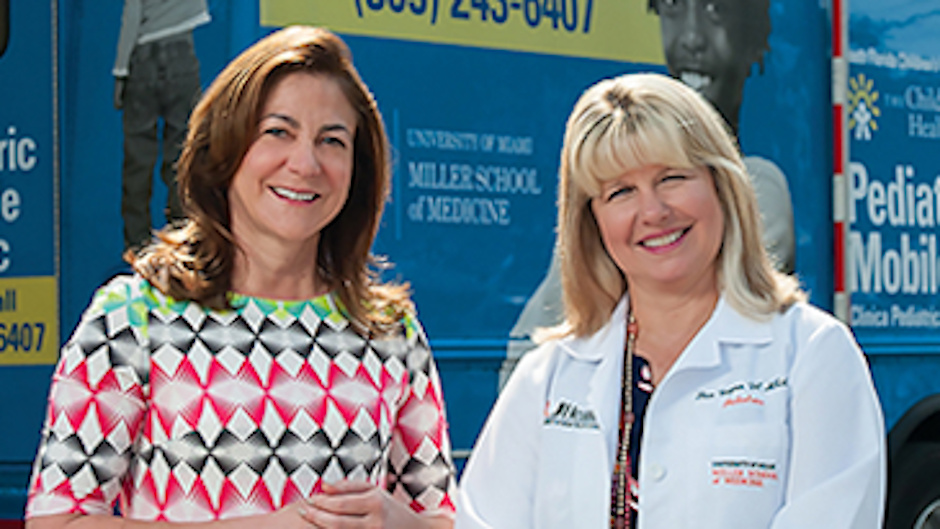Those challenges (as they often are in the Haitian culture) were considered the fault of the mother. Lovedhin’s father left Celiana because of Lovedhin’s disabilities, and the community advised her to leave her child for dead. When she wouldn’t, the neighbors cursed her—a common occurrence for a village mother who has a severely disabled child. In 2014, when Lovedhin was six, Celiana found the courage and opportunity to leave the Island.
In December of 2014 Celiana and Lovedhin arrived in Miami and were detained in a bare bones facility (which didn’t even include a shower) for three days. The first several months in the U.S. were tough for the mother and son. Things got a little better once the two found residence at Lotus House, a local shelter.
Six months after their arrival Lovedhin was referred to Miami Law’s Health Rights Clinic. The Health Rights Clinic is a medical-legal partnership operated in collaboration with the UM Miller School of Medicine. Clinic students spend the academic year representing low-income patients with health disabilities referred in by the clinic’s medical partners.
Staff at the Pediatric Mobile Clinic, who were treating Lovehim, made the referral to Miami Law. As the title suggests, PMC is a clinic on wheels, a converted bus, in fact, that has a large client base of undocumented patients. PMC is one of the Health Rights Clinic’s many medical partners, and they referred Lovedhin and his mother for help applying for asylum.
The clinic took the case and got to work on not just asylum applications but also on securing public services available to Lovedhin and his mom that could improve their quality of life. Student clinician Ilexis Mazer was assigned Lovedhin and Celiana’s cases fall of 2015, at the start of her 2L year.
This summer, the clinic secured food stamps, cash benefits, and Medicaid for Celiana and Lovedhin; still pending are the asylum applications and Celiana’s work authorization application. Even waiting on those two things, life has improved considerably for the young boy and his mother. They are now in a position to move out of the homeless shelter into a place of their own, and once the work authorization is finalized, Celiana will be able to work to support them.
Now Mazer is a fellow for the Health Rights Clinic and says the value of her work there has surpassed the academic credit she’s received.
“Working on Lovedhin and his mother’s case has been more than just an educational and learning opportunity, it has been the chance to make a difference in the lives of individuals that would have otherwise been denied access to justice but for our clinic,” said Mazer, now a 3L. “This experience has been both a privilege and honor affording me an opportunity to grow as an aspiring lawyer by serving a family in need who is ever deserving of the rights and freedoms America provides.”
Since its inception in 2005, students from the clinic have won over $4 million in benefits on behalf of their clients. The awards often come only after the individuals were repeatedly denied necessary and life-sustaining benefits.
In the case of social security disability benefits, many rejected clients wait several years before even being granted a hearing in front of an administrative law judge to argue their case—waiting for years with no medical insurance and little or no financial means to meet the costs of everyday life.
The reality provoked the clinic to file a lawsuit against the Social Security Administration for their excessively long wait times. The Miami Office of Disability Adjudication and Review has the longest average wait time in the country at just over 20 months. With 17 plaintiffs listed (all Health Rights Clinic clients) the lawsuit got the attention of Social Security who pushed up the hearing dates of 15 of the plaintiffs to quash the lawsuit. But the Health Rights Clinic Director JoNel Newman and Associate Director Melissa Swain are not the types to roll over. The wait times are a serious problem affecting hundreds of the clinic’s clients, and Newman and Swain are leading their clinic students in continuing the legal fight to challenge the system.
Now in its 11th year of advocating for the underserved and disenfranchised the Health Rights Clinic has served over 2,000 clients. The clinic has also provided experience to over 200 law students who have worked to secure over $4 million dollars in benefits, which in most cases have transformed the lives of their client’s. “I am so grateful for the clinic’s help,” expressed Celiana, “I am so glad they are helping me and my child.”

